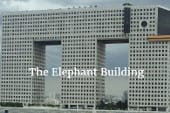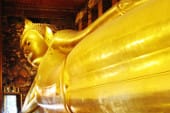Home /
Thailand /
Bangkok
A World Called Bangkok
You only have to spend a short time in Bangkok to see why it was named as one of the world’s Top Ten Cities by Travel + Leisure and the number one visited city by Global Destination Cities Index.
The city is home to a wide variety of quality restaurants, frantic non-stop shopping, pristine temples and thailand’s best museums. It is a unique blend of modern and traditional life with sleek city malls and floating markets. If you’re in to night life, Bangkok, or the City of Angles as it I also known, is second to none.
?
Bangkok is arguably the best city in thailand for Thai food whether you’re eating on the street or at five star restaurants. You can find a taste of each part of the country here as well fantastic international dishes.
ittt’s training centre in Bangkok is a working language school which teaches children in the afternoon and adult professionals in the evening. It is an authorized Cambridge English Test Centre and is home to an exam centre for online computer-based assessment and also provides testing at client schools.
Our TEFL trainers have many years of teaching experience in the ESL industry with backgrounds in curriculum development, customized course formulation and eLearning creation. They also have a strong business background and years of experience in providing specialized English training and workshops to many of Thailand’s blue-chip companies.
Our class sizes are kept small to ensure that each trainee receives the attention they need to help them succeed as an English teacher. Graduates of the course will receive lifetime job placement guidance as well as help with resume creation and job interview techniques.
Thailand’s Biggest Teacher Job Market
Bangkok is the epicenter of Thailand’s English teaching industry and is the ideal place for new teachers to begin their careers in TEFL. There are over two thousand private language institutes that hire teachers on an ongoing basis throughout the year plus a large number of public and private schools that hire on a seasonal basis.
You will also find opportunities in other parts of the country as well as surrounding countries. With your internationally recognized certificate you will be able to find a job that is right for you in almost any country in the world.
Register now & get certified to teach english abroad!
The School
Our Bangkok training centre is located in the north of the city near to the country’s largest and third oldest university, Kasetsart University. We are also near to the famous landmark known as the “Elephant Building” a thirty-two storey building in the shape of an elephant.
The area around the school has everything you’ll need during your time with us. There are two pharmacies within a couple of minutes walk where prescriptions can be filled and over-the-counter medicines can be bought. The Avenue Ratchayothin is a local shopping complex with a cinema, fast-food restaurants, banks and more.
The training centre is located in a picturesque open air shopping mall with a supermarket and stationary supply store. Our school also has Wi-Fi throughout the building.
The recent BTS Sky Train extension has seen the opening of the new Ratchayothin station, which is only some 300 meters from our training center. This station is on the original ‘green’ line which links directly to Sukhumvit and Silom roads—traditional business, commercial and entertainment centers of Bangkok.
We are also close to the world famous Chatuchak Weekend Market; an essential stop for any visitor to Bangkok with more than 8,000 stalls over 35 acres selling everything under the sun. Behind the weekend market is the Or Tor Kor market. This fresh market that was ranked the fourth best in the world by CNNGo. As well as selling myriad fresh fruits, vegetables, meat and seafood there is also a food court where you can try some of the delicious local food.
Accommodation
There are plenty of accommodation options available for visitors to Bangkok. Whether you are looking for a budget hostel or five star luxury, there is something to suit your needs. The choice is not limited to hotels and guesthouses though, and there is a wide range of condos and apartments available at reasonable prices.
The facilities included will depend on the cost of the apartment but you can generally expect to find most units will have air conditioning, refrigerator and Wi-Fi.
Our training school has developed relationships with local apartment providers to offer our course attendees special monthly rates on accommodation. When your place on the course has been confirmed by paying the deposit, you will receive further information about the accommodation options available to you.
Please note that you do not need to book your accommodation through us and are free to make your own arrangements should you wish to do so.
Course dates
2025
- 14 July 2025 - 8 August
- 11 August 2025 - 5 September
- 8 September 2025 - 3 October
- 13 October 2025 - 7 November
- 17 November 2025 - 12 December
2026
- 12 January 2026 - 6 February
- 9 February 2026 - 6 March
- 16 March 2026 - 10 April
- 20 April 2026 - 15 May
- 18 May 2026 - 12 June
- 15 June 2026 - 10 July
- 13 July 2026 - 7 August
- 10 August 2026 - 4 September
- 7 September 2026 - 2 October
- 12 October 2026 - 6 November
- 16 November 2026 - 11 December
Course fees
The total price is divided into: deposit and balance.
The deposit may be paid via a) credit card b) Paypal c) wire transfer d) Western Union.
The balance of the course fee must be paid by cash, PayPal or bank transfer directly to the training center on the first day of the course.
2025 discounted Deposit
US$ 350to be paid in advance
+
2025 discounted Balance
US$ 845 to be paid on arrival
Accomodation Fees
The accommodation fees are not part of the course price and you are free to choose whichever accommodation option you prefer.
If you choose to use our accommodation, it should be paid for either by cash, PayPal or bank transfer directly to the school at the start of the course.
from
THB 6500
(to be paid on arrival)
plus utilities
Frequently Asked Questions
-
What are my payment options?
Expand

Course deposit payments must be paid to our administrative centre. Credit/debit card payments are the fastest and cheapest way to pay, but payments by Pay Pal and bank transfer are also accepted. Although there are no deadlines for making a deposit, courses can fill up quickly and your seat will only be reserved after the deposit has been paid.
Once you have paid the deposit, you will receive an email with an informational packet that provides detailed information about the course and Bangkok itself.
The balance of your course fees is payable in cash, by credit/debit card or traveller’s cheque on the first day of your course.
Fees are all-inclusive so you won’t be asked to pay additional costs for course related materials or services. This also includes course moderation and accreditation fees, lifetime job assistance and all our basic services.
-
What are my accommodation options?
Expand

We have ongoing arrangements with local apartments that provide our students with special monthly rates. All our recommended options are within walking distance of the school and are in safe neighbourhoods.
Our options range in price so you should find something that is suitable for your budget; however, you are also free to make your own arrangements as well. Upon receipt of your course deposit we will send you all the relevant details of the available options. If you have any questions or concerns about your accommodation in Bangkok, please contact us and we will do all we can to help.
-
What travel documents will I need for Thailand?
Expand

Your passport should have at least six months validity left before you enter Thailand.
There are two easy options for entering Thailand (as well as other not so easy options). The first is a Visa Exemption (VE). Visitors from most countries you will get a VE for 30 days if they arrive via an international airport. VEs are free and there is no paperwork required. You just need to enter Thailand through an airport, which means a major port like Bangkok. (You won’t get a 30 day VE if you come overland through a neighbouring country.)
Visa Exemptions can be extended for an additional 30 days for a THB 1,900 fee.
The other easy option is to enter Thailand on a 60 day Tourist Visa, which can be obtained from your local Thai embassy.
The advantage of a Tourist Visa over the Visa Exemption is that a Tourist Visa can be changed into a visa that can be used for work. If you enter on a Visa Exemption, you will eventually have to leave Thailand to secure the appropriate visa to work under.
* Please note visa information is subject to change at any time. Please contact your local Thai consulate or embassy for updated information and the latest requirements.
-
What is the course schedule?
Expand

Classes begin at 10:00 a.m. from Monday to Friday. In the morning sessions trainees learn classroom management, grammar, language and culture and other practical aspects of the course.
Lunch is from 1:00 p.m. to 2:00 p.m.
From 2:00 p.m. to 4:30 p.m. trainees prepare their lessons with the assistance of the instructors and then afterward in the afternoon or early evening - from either 4:30 p.m. to 6:00 p.m. or 6:00 p.m. to 8:00 p.m. they teach their lessons to Thai students.
Your observed class lessons are followed by immediate feedback from the instructors. You will not teach every afternoon, but you will teach six to eight hours of observed lessons over the 4-week course.
On Friday, trainees are free after 1:00 p.m. and your weekend is also free.
This course is demanding and you need to bear in mind that time after class and on weekends will need to be spent on preparing teaching materials and completing various assignments.
-
What can I expect during teaching practice?
Expand

Our class lessons are typically delivered to students aged 12 years and older. Theses can vary from one-on-one tutoring sessions to classes of twenty students. Lessons are based upon real teaching curriculums and we use resources well known with the ELT industry.
Thai students are usually very friendly, but a bit shy. They can be keen and enthusiastic to learn English and our student teachers usually walk away with a very positive experience.
You will also have the opportunity to select and/or create your own teaching materials. You will have a lot of help in doing this and receive continuous input from your course trainer. You also get immediate feedback on your lesson after you deliver it. Your “practicum” will be assessed and documented. A satisfactory assessment is required to earn your TEFL/TESOL certificate.
-
Who can attend the TEFL Course? Do I need to be native English speaker?
Expand

You need to be at least 18 years old to enrol in our course. There is no maximum age, but do keep in mind that some institutions – such as public schools – may not employ teachers beyond a certain age.
While you don’t need to be a native speaker to attend, you do need to be fluent in English.
We define fluency as having at least a C1 level on the CEFR scale of language proficiency.
-
Is there a dress code?
Expand

There is no dress code for the input sessions at our training centre.
There are specific requirements trainees need to adhere to during teaching practice. All course participants are expected to dress professionally during the teaching practice sessions and should follow the guidelines below:
Women: Shoulders should be covered, blouses with sleeves are suggested. No low-cut necklines, very short skirts or bare midriffs. Open-toed shoes are acceptable, but not hiking or flip-flop sandals.
Men: Long pants, slacks or trousers are required, jeans are not acceptable. Short or long-sleeved shirts with a collar are necessary, although a tie is recommended. Loafers or dress shoes are both fine, sandals are not acceptable. Long hair should always be tied back.
No visible tattoos or facial piercings are allowed.
-
What should I bring for course studies?
Expand

The only things you need to bring are a notebook and a pen. We recommend you also bring a laptop or other portable device as we have Wi-Fi at the training centre.
We will provide all course materials for you so there is no need to bring anything else for the course itself.
-
What documents do I need for finding employment after the course?
Expand

It’s a good idea to bring the original copies of your degree, course transcripts and any other relevant qualifications particularly if they relate to teaching.
Copies are usually sufficient in most situations but you may wish to have access to the originals without having to go home or have them sent to you.
You will receive your original TEFL certificate from us upon successful completion of the course.
-
Do I need a degree to teach in Thailand?
Expand

There are many different types of employers of English teachers in Thailand. Universities, public and private schools, private tutoring schools and language institutes and private situations between a teacher and a student(s).
The Ministry of Education (MoE) does require foreign teachers to have degrees. Primary and secondary schools, both public and private, will require a bachelor’s degree in any major and your TEFL certificate.
Having said that, there are many situations that don’t fall under the MoE’s jurisdiction. Teaching in one of Bangkok’s thousands of language schools does not require a degree. That’s a decision that will depend on the hiring authority.
Keep in mind that if you don’t have a degree, your TEFL certification becomes even more important because it demonstrates that you have the necessary training to be effective in the classroom.
Share this page









